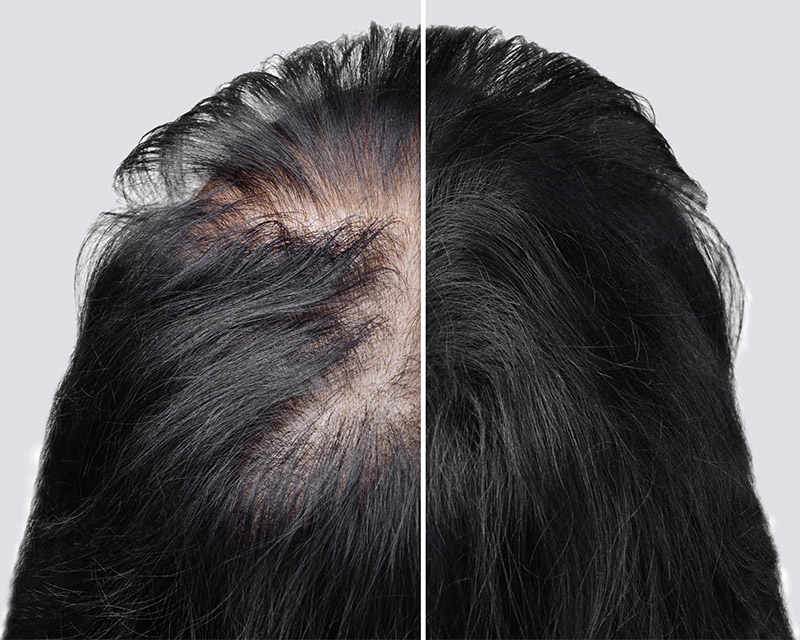Maintaining a healthy weight is crucial for overall well-being. But did you know weight loss itself might impact your hair?
While shedding some pounds can be beneficial, crash diets or drastic calorie restrictions can stress your body and lead to temporary hair loss. This is because hair growth relies on essential nutrients.
Want to learn more about creating a healthy weight loss plan or address hair loss concerns?
Stay with us at Capstone Medical Centre; We can connect you with qualified professionals who can guide you on your journey towards a healthier you!
Understanding the Hair Growth Cycle
Hair growth is a fascinating cycle with distinct phases. Each hair follicle goes through an anagen (growth) phase lasting 2-7 years, producing new hair cells. This is followed by a short catagen (transition) phase lasting a few weeks. Finally, the hair enters the telogen (resting) phase, lasting 3 months, before eventually shedding.
Hair health is a complex interplay of factors.
- Nutrition: A balanced diet rich in protein, iron, zinc, and vitamins like A, B, C, D, and E is essential for healthy hair growth. Deficiencies in these nutrients can disrupt the hair cycle and lead to hair loss.
- Genetics: Hair loss patterns can be hereditary. While you can’t change your genes, early detection through a doctor’s consultation can help manage hair loss effectively. [Find a doctor near me]
- Health Conditions: Certain medical conditions, hormonal imbalances, and thyroid issues can also contribute to hair loss. Discussing your concerns with a doctor can help identify underlying causes and develop appropriate treatment plans.
The Connection Between Weight Loss and Hair Loss

While weight loss is often celebrated for its health benefits, some people experience unexpected hair loss during their weight loss journey.
Our bodies prioritise essential functions during periods of significant calorie restriction or rapid weight loss. Hair growth, though important, isn’t considered critical for survival.
This prioritisation can lead to temporary hair loss, a condition known as telogen effluvium. Telogen effluvium occurs when hair follicles are pushed prematurely into the resting (telogen) phase, increasing shedding.
The severity of hair loss can depend on the rate and amount of weight loss. Crash diets or restrictive plans that drastically reduce calorie intake are more likely to trigger hair loss than gradual, balanced weight loss approaches.
This is because extreme calorie restriction can deprive hair follicles of essential nutrients needed for healthy hair growth, including:
- Protein: The building blocks of hair, protein deficiencies can lead to weak and brittle hair prone to breakage.
- Iron: Crucial for transporting oxygen to hair follicles, iron deficiency can contribute to hair loss.
- Zinc: Zinc plays a role in hair growth and cell division, but zinc deficiencies can disrupt the hair growth cycle and lead to shedding.
Consider a consultation at our Weight Loss Clinic for personalised guidance on healthy weight loss.
Nutritional Deficiencies and Hair Loss

Certain nutrients are particularly important for maintaining healthy hair and promoting growth. These include iron, zinc, biotin, and protein.
- Iron: is essential for delivering oxygen to hair follicles, and deficiencies can disrupt this process, leading to hair loss.
- Zinc: plays a vital role in hair follicle function and recovery, and a deficiency can lead to hair loss.
- Biotin: a B vitamin, is often associated with hair growth and health.
- Protein: This is also crucial as your hair is primarily made of keratin, a hardened protein.
However, restrictive diets, often used for weight loss, can lead to deficiencies in these essential nutrients. Rapid weight loss or a diet lacking essential nutrients can disrupt the normal hair growth cycle, leading to hair loss.
This is because hair follicle cells are among your body’s most rapidly dividing cells, and nutrient deficiencies can negatively affect their growth.
If you’re planning a weight loss journey, it’s important to ensure your diet is balanced and contains all the necessary nutrients. Consulting with professionals at a weight loss clinic can help you plan a healthy and balanced diet.
If you’re experiencing hair loss, consider visiting a hair loss clinic or a doctor near you to discuss potential nutrient deficiencies and treatment options.
Stress and Hormonal Changes

Stress and hormonal changes can significantly impact hair health. One crucial hormone in this process is cortisol, often referred to as the “stress hormone”.
Cortisol is produced by the adrenal glands in response to stress. It’s essential for many bodily functions, including metabolism and immune response. However, prolonged high cortisol levels can lead to various health issues, including hair loss.
A study found that hair cortisol levels are associated with overweight and obesity, suggesting that stress and weight are interconnected.
Weight loss, particularly rapid or significant, can induce stress and cause hormonal imbalances. This is because the body perceives rapid weight loss as a form of physical stress, leading to increased cortisol production. These hormonal changes can disrupt the normal hair growth cycle, leading to hair loss.
If you’re experiencing hair loss during or after weight loss, it’s important to manage stress levels and ensure a balanced diet to maintain hormonal balance.
Types of Weight Loss-Related Hair Loss

Telogen Effluvium
Telogen Effluvium is a common form of temporary hair loss that occurs when a significant number of hair follicles on the scalp enter the resting (telogen) phase of the hair growth cycle simultaneously, causing these hairs to fall out. This condition can be triggered by various factors, including significant physical stress, such as rapid weight loss or a high fever.
Crash dieting, or a diet lacking essential nutrients, often associated with rapid weight loss, is a common cause of Telogen Effluvium. In fact, hair loss has been associated with a weight loss of 20 pounds or more. It’s also been linked to bariatric (weight loss) surgery.
Alopecia Areata
Alopecia Areata is an autoimmune disorder characterised by patchy hair loss, usually on the scalp. The exact cause of this condition is unknown, but it’s believed to be triggered by various factors, including stress and hormonal changes.
While there’s no direct evidence linking weight changes to Alopecia Areata, any form of physical stress, including drastic weight changes, can potentially trigger autoimmune responses in susceptible individuals.
If you’re experiencing hair loss during or after weight loss, it’s essential to consult with professionals at a weight loss clinic or a Hair loss clinic to discuss the potential causes and treatment options.
Preventing Hair Loss During Weight Loss

A balanced diet is the cornerstone of overall health and well-being. It provides the fuel your body needs to function effectively and is particularly important when trying to lose weight. A diet lacking essential nutrients can lead to various health issues, including hair loss.
Importance of a Balanced Diet
Recent nutrition trends are focused on longevity, sustainability, and overall wellness. Nutrition experts highlight the need for a balanced diet rather than quick results from fad diets. A balanced diet can help regulate blood sugar levels, provide sustained energy throughout the day, and positively impact mental well-being.
Incorporating Protein and Biotin Sources into Meals
Protein is a crucial nutrient for hair health as your hair is primarily made up of keratin, a hardened protein. Quality protein sources, such as whey protein and casein found in milk, eggs, and meat, provide all essential amino acids and are easily digestible, making them ideal for muscle repair and growth.
Consuming complementary proteins throughout the day can provide a complete protein source for those following a plant-based diet.
Biotin, a B vitamin, is often associated with hair growth and health. It can be found in a wide range of foods, including egg yolk, organ meats, nuts, seeds, sweet potatoes, and avocados6.
Considering Supplements Under Medical Guidance
While a balanced diet should provide all the nutrients your body needs, sometimes supplements may be necessary, especially if you have certain dietary restrictions or health conditions.
However, it’s important to remember that supplements should not replace a balanced diet. They should be used to fill nutritional gaps and should always be taken under medical guidance.
Tips for Healthy Weight Loss

Gradual vs. Rapid Weight Loss: Implications for Hair Health
When it comes to weight loss, the rate at which you lose weight can have significant implications for your hair health.
A systematic review and meta-analysis published in 2020 found that gradual weight loss promoted greater fat mass and body fat percentage reductions and significantly preserved Resting Metabolic Rate (RMR) compared with rapid weight loss.
However, another study challenged the common belief that losing weight gradually is better in the long term than rapid weight loss, showing that regaining weight was just as common regardless of the speed of weight loss.
Consulting Healthcare Professionals
Consulting healthcare professionals such as nutritionists and dermatologists can provide valuable guidance and support during your weight loss journey. Nutritionists can help you plan a balanced diet that meets your nutritional needs while supporting weight loss, and dermatologists can provide advice and treatment options if you’re experiencing hair loss.
If you’re experiencing hair loss, consider consulting with professionals at a weight loss or Hair fall clinic.
Addressing Underlying Health Issues
Hair loss can be a distressing symptom, particularly when it persists or is severe. It’s important to seek medical advice if you experience persistent hair loss. Early Treatment can help prevent significant permanent damage. Treatments for hair loss have become more effective than ever, making it crucial to seek help early.
Possible Medical Conditions Linked to Both Weight Loss and Hair Loss
Several medical conditions can cause both weight loss and hair loss. These include:
- thyroid disease
- lupus
- diabetes
- iron deficiency anaemia
- autoimmune diseases
- eating disorders
- scalp infections such as ringworm
In addition, certain medications used for weight loss, including Ozempic, Wegovy, Mounjaro, and Zepbound, have been investigated for possible side effects, including hair loss.
However, it’s important to note that hair loss associated with these medications is likely due to the significant weight loss that results from their use rather than the medications themselves.
Conclusion
In conclusion, weight loss and hair health are interconnected, with factors like diet, stress, and underlying health issues playing key roles. If you’re experiencing hair loss or planning a weight loss journey, consider contacting the professionals at Capstone Medical Centre. We offer expert guidance and support to help you navigate your health journey effectively and safely.
Sources:


1 thought on “Can Weight Loss Cause Hair Loss?”
Comments are closed.